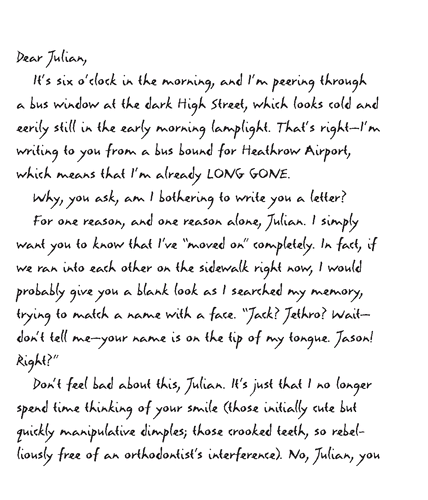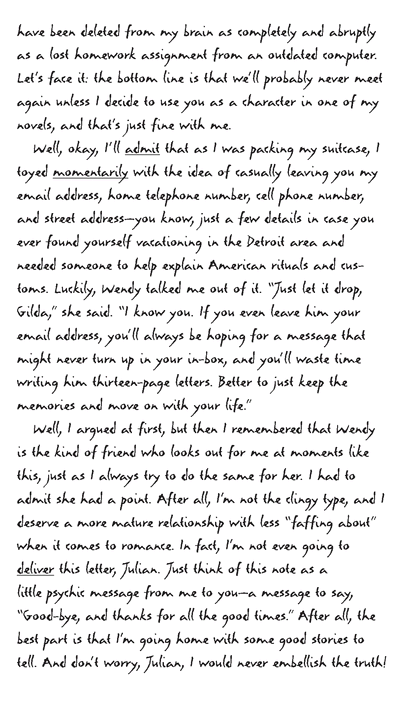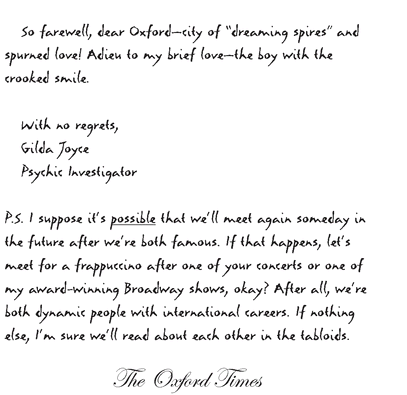Authors: JENNIFER ALLISON
The Ghost Sonata (38 page)
“Has your son been very gifted from a very young age, Mr. Graham?”
“I must say, he took to the piano quickly. This surprised us, you see, because he wasn't potty trained until age five.”
Embarrassed, sympathetic chuckles rippled through the small gathering.
“Complete twaddle,” spat Julian, wondering why he was never able to come up with a quick comeback around his father. He wished he could become invisible and slip from the room.
“Now, Julian, you know it's true,” Julian's father insisted, warming to his audience. “I'm telling you; his mum couldn't find nappies large enough. In the end, she had to cut up our best white sheets and use them to cover his bum.”
He just can't help trying to steal the show at my expense
, Julian thought.
He's like some second-rate comedian. If it were anyone else, I'd come up with a scathing joke right now to put him in his place, but for some reason, I can't think of a thing to say.
, Julian thought.
He's like some second-rate comedian. If it were anyone else, I'd come up with a scathing joke right now to put him in his place, but for some reason, I can't think of a thing to say.
“Yes, you'd never know it now, but Julian was a rather plump boy in those days,” Mr. Graham continued. “We thought his fingers would be too fat to tie his shoes, let alone play the piano. Of course, now he's all skin and bones. . . .”
Stop talking, stop talking, stop talking!
For once, Julian felt relieved when he spied Mr. Goodwin, his piano teacher, elbowing his way through the congested hallway toward him.
For once, Julian felt relieved when he spied Mr. Goodwin, his piano teacher, elbowing his way through the congested hallway toward him.
“Julian!” Mr. Goodwin embraced Julian briefly and slapped him on the back. “Just look at youâyou already have a fan club! I thought I was trying to approach a rock star for a moment there. I don't know how you did it, but you amazed me this time! Very fine playing indeed!” He turned to Julian's father. “You must be immensely proud as well, Mr. Graham.”
“Of course. It's like I always told Julian, âIf you spent half as much time practicing as you do goggling the young totties in town, you might come to something.'”
Much to Mr. Graham's satisfaction, this comment elicited more laughter, but for Julian, this was the last straw. “You never did tell me that, Dad,” he muttered.
“Of course I did, son.”
“What you told me was, âDon't bother playing dead music on a dinosaur instrument.'”
Mr. Graham's face reddened. “I don't remember saying that. If I ever did, it was because you kept tinkering away at the ivories when there were real jobs to be done around the place.”
Feeling increasingly uncomfortable as they sensed the personal conflict erupting between father and son, the group of well-wishers hastily extended their hands, offered congratulations, and dispersed.
“We know how boys his age can be, don't we?” A pleading tone entered Mr. Graham's voice. “Anything to prevent themselves from doing a decent day's work, right?”
“I know Julian worked very hard to perform the way he did tonight, Mr. Graham,” said Mr. Goodwin, eyeing Julian's father with an expression of mild concern. “And regardless of the outcome of this competition, I believe he has a future as a musicianâif he wants it.”
I do want it.
The new feeling of certainty surprised Julian. Admitting to himself that he actually wanted somethingâeven something as uncertain as a music careerâmade him feel stronger for some reason.
The new feeling of certainty surprised Julian. Admitting to himself that he actually wanted somethingâeven something as uncertain as a music careerâmade him feel stronger for some reason.
“We'd best be shoving off now,” said Mr. Graham, suddenly impatient. He turned to head for the coatroom.
Julian observed his father, who now stood in line looking very short and ordinary as he waited to retrieve his coat.
It's not that Dad isn't proud of me
, Julian reflected,
but I've finally realized something: he's also jealous of me
.
It's not that Dad isn't proud of me
, Julian reflected,
but I've finally realized something: he's also jealous of me
.
Anger and sadness combined with pity as Julian watched his father search his pockets for the ticket to claim his checked belongings.
There's a tiny part of him that wants me to fail
, Julian thought,
but I'm not going to do it. I'm not going to please him in that way
.
There's a tiny part of him that wants me to fail
, Julian thought,
but I'm not going to do it. I'm not going to please him in that way
.
Â
Wendy wandered into the lobby looking for Gilda and was astonished when complete strangers approached her wearing expressions of bright, eager curiosity. “I loved that piece you played!” they said. “Who composed it?”
Confused, fascinated stares met Wendy's reply.
A fourteen-year-old boy who had composed such music? Why had they never heard of him before?
A fourteen-year-old boy who had composed such music? Why had they never heard of him before?
Within moments, Wendy found herself speaking to a young woman who wrote freelance articles for
The Oxford Times
, divulging the story of how she and her friend Gilda had discovered the Sonata in A Minor in the well near St. Margaret's Church.
The Oxford Times
, divulging the story of how she and her friend Gilda had discovered the Sonata in A Minor in the well near St. Margaret's Church.
Then, across the room, Wendy glimpsed Mrs. Mendelovich's frozen smile. As her teacher approached, Wendy felt as if she were awakening from the dream of her performance and facing an uncomfortable reality: Mrs. Mendelovich and her parents, who had seemed so small and far away just hours before, once again loomed in the present, watching her and shaking their heads with disappointment. How could she possibly explain herself?
“A ghost made me play the music,”
sounded ridiculous, even if she was now convinced that it was true.
But in the end, I also chose to play it because I wanted to
, Wendy reflected.
No matter what happens in the competition, that performance was totally my own.
“A ghost made me play the music,”
sounded ridiculous, even if she was now convinced that it was true.
But in the end, I also chose to play it because I wanted to
, Wendy reflected.
No matter what happens in the competition, that performance was totally my own.
“Mrs. Mendelovich,” Wendy faltered. “IâI'm sorry . . .”
“You look lovely, Windy,” said Mrs. Mendelovich, silencing her student with a perfunctory embrace and an air kiss.
“Mrs. Mendelovich, I wanted to tell youâ”
Mrs. Mendelovich held up a hand and shook her head. She clearly did not want to hear Wendy's explanationâat least not yet. “We weell talk later.” She patted Wendy's hand in a manner that seemed to say,
Don't bother trying to explain; there's no point. It's over.
Don't bother trying to explain; there's no point. It's over.
Gone were her teacher's exuberant accolades, perfumed hugs, and promises of greatness. Wendy had always found these demonstrations of affection suffocating, but without them, she now felt as if she were standing alone, exposed on a windy plain.
Wendy watched her teacher breeze away from her and toward Ming Fong.
Â
Usually, when Wendy played well in a competition, her parents treated her as if it were her birthday for that day. Sometimes they took her to a restaurant for her favorite foods. Sometimes the reward was a shopping trip or a wrapped present. Then there were the inevitable phone calls to friends and relatives to relive the honor of the experience.
Now, as Wendy left the Sheldonian Theater, she walked into a dark, silent street alone.
It's weird
, she thought.
I honestly feel like I just gave the best performance of my life, but I've never felt lonelier. It isn't a completely bad feeling, but I have to admitâfreedom is kind of lonely.
, she thought.
I honestly feel like I just gave the best performance of my life, but I've never felt lonelier. It isn't a completely bad feeling, but I have to admitâfreedom is kind of lonely.
Teacher's pet.
She had always hated this label in school. She had always felt embarrassment at being singled out; how surprising that she now felt a strange grief at losing her “teacher's pet” role with Mrs. Mendelovich.
She had always hated this label in school. She had always felt embarrassment at being singled out; how surprising that she now felt a strange grief at losing her “teacher's pet” role with Mrs. Mendelovich.
“Wendy! Wait up!”
With relief, Wendy turned to see Gilda running toward her in her sequined dress and tiara.
“What are you doing out here? Where's your coat?”
“Left it . . . in the theater.” Gilda leaned forward and placed her hands on her knees to catch her breath.
“Where were you? Did you even see my performance?”
“Yes, and you sounded great! But where were you before the competition started? I looked
everywhere
!”
everywhere
!”
“Oh. Sorry. I just needed some time to myself away from everyone's nerves and everything, and I found this room backstage that nobody else knew about.”
“Anyway, that doesn't matter now because I have
so much
to tell you.” Gilda clutched her bare arms. Her teeth chattered, but she hardly noticed; she was so excited to tell Wendy about the final breakthrough in the investigation.
so much
to tell you.” Gilda clutched her bare arms. Her teeth chattered, but she hardly noticed; she was so excited to tell Wendy about the final breakthrough in the investigation.
“Gilda, you're freezing. Let's get your coat.”
“Just listen to this first.”
“Don't tell me; you made up with Julian, and now you're in love again.”
“Oh,
please
. Wendy, I've just been to Professor Waldgrave's house, and he told me everything! I know
exactly
what happened to Charles Drummond, and why his ghost has been haunting this competition!”
please
. Wendy, I've just been to Professor Waldgrave's house, and he told me everything! I know
exactly
what happened to Charles Drummond, and why his ghost has been haunting this competition!”
As Wendy listened to the story of the untimely death of the fourteen-year-old boy and the fate of the music he had written, she felt a strange feeling of release. A crucial piece of a maddening puzzle had finally fit in place, allowing her to see everything clearly. The music had finally been performed, and Charles Drummond had reached his audience. Still, her mind spun with bewildering questions about her own bizarre experience in Oxford.
“Gilda,” she ventured as the two of them returned to the theater to find Gilda's coat, “with all the musicians around here, why do you think his ghost picked
me
to play that music?”
me
to play that music?”
“I've been thinking about that, too,” said Gilda. “And I really don't know. Maybe he just liked the way you play. Or maybe you were the only person who was willing to
listen
to him.”
listen
to him.”
“I couldn't
help
listening to him.”
help
listening to him.”
“See? You
could
be a little clairaudient, Wendy.”
could
be a little clairaudient, Wendy.”
“I don't think I want to be.”
“I know it's scary, but if you learned to control it more, it could be a great skill to have for our psychic investigations.”
“You mean, it would be a great skill for
your
psychic investigations.”
your
psychic investigations.”
“I think we solved this haunting together, don't you?”
“I guess. Except I was the one who was haunted, so that's kind of different.”
“Can you imagine what we could accomplish back home? With your clairaudient skills and my psychic detective know-how, I bet we could solve things we've never even dreamed about!”
“We'll see.” At the moment, Wendy simply wanted to sleep long and hard, without dreams of any kind. She wanted to go home and face her parents' prying questions, to play the piano and see her father tilt his head as he listened for mistakes, to hear her little brother's nonsensical chatter, to walk through clean rooms decorated with her mother's carefully positioned good-luck charmsâthe red frogs, the money plants, the mirrors. Whether or not they actually brought luck, they would feel familiar and safe, and for at least the first few days, she would be happy to be home, whether or not she was returning as a competition winner.
53

The Winners



Other books
Shared for Love (Kagan Wolves) by Nancy Corrigan
The Demon's Grave by E.M. MacCallum
Torment by Lauren Kate
A Lovely Day to Die by Celia Fremlin
Designed by Love by Mary Manners
Philippa by Bertrice Small
Infamy by Robert K. Tanenbaum
Looks to Die For by Janice Kaplan
Ill Will by J.M. Redmann
Before the Dawn by Max Allan Collins
